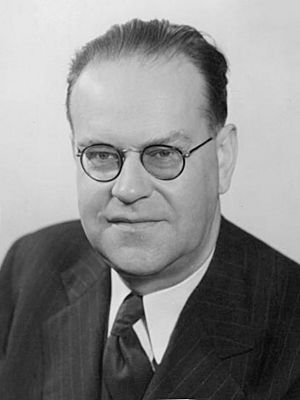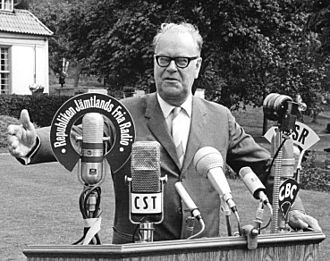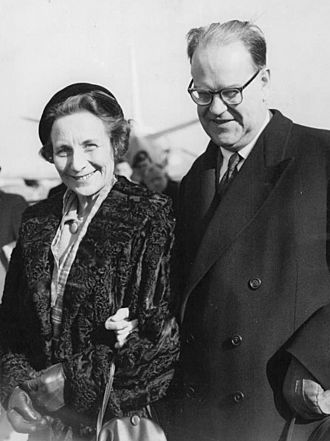Tage Erlander facts for kids
Quick facts for kids
Tage Erlander
|
|
|---|---|

Erlander in 1949
|
|
| Prime Minister of Sweden | |
| In office 11 October 1946 – 14 October 1969 |
|
| Monarch | Gustaf V Gustaf VI Adolf |
| Preceded by | Per Albin Hansson |
| Succeeded by | Olof Palme |
| Leader of the Social Democratic Party | |
| In office 11 October 1946 – 1 October 1969 |
|
| Preceded by | Per Albin Hansson |
| Succeeded by | Olof Palme |
| Minister of Education | |
| In office 31 July 1945 – 11 October 1946 |
|
| Prime Minister | Per Albin Hansson |
| Preceded by | Georg Andrén |
| Succeeded by | Josef Weijne |
| Personal details | |
| Born |
Tage Fritjof Erlander
13 June 1901 Ransäter, Sweden |
| Died | 21 June 1985 (aged 84) Huddinge, Sweden |
| Political party | Social Democrat |
| Spouse |
Aina Andersson
(m. 1930) |
| Alma mater | Lund University |
| Awards | Illis quorum 1984 |
| Signature | |
Tage Fritjof Erlander (born June 13, 1901 – died June 21, 1985) was a Swedish politician. He served as the Prime Minister of Sweden for a very long time, from 1946 to 1969. This was 23 years in a row!
Erlander was also the leader of the Swedish Social Democratic Party. He is often called "Sweden's longest Prime Minister." This refers to both how tall he was (192 cm, or about 6 feet 3 inches) and how long he was in office.
He became Prime Minister unexpectedly after the previous leader, Per Albin Hansson, passed away. Erlander was known for being calm and practical. He often worked with other political parties to get things done.
During his time, Sweden introduced many important changes. These included universal health insurance (healthcare for everyone) and better pensions for older people. The public sector, which means services run by the government, also grew.
Contents
Who Was Tage Erlander?
Tage Erlander was a very important leader in Sweden. He helped shape the country into what it is today. His time as Prime Minister saw Sweden become a strong and wealthy nation.
Early Life and Education
Tage Erlander was born in Ransäter, a place in Värmland County, Sweden. His parents were Alma and Erik Gustaf Erlander.
When he was a student at Lund University, he was very active in student politics. He met many students who had strong political ideas. He studied political science and economics, finishing his degree in 1928.
After university, he served in the military for a short time. He also worked for an encyclopedia called Svensk uppslagsbok from 1929 to 1938.
Starting in Politics
Erlander began his political career in his local town. He was elected to the municipal council in Lund in 1930. Just two years later, in 1932, he became a member of the Swedish parliament.
In 1938, he became a State Secretary in the Ministry of Social Affairs. This was an important role where he helped manage social programs.
Becoming Prime Minister
In 1944, Erlander joined the government as a minister. The next year, he became the Minister for Education.
In 1946, the Prime Minister, Per Albin Hansson, suddenly died. Tage Erlander was then chosen to be the new Prime Minister. He also became the leader of the Social Democratic Party.
In his first election in 1948, he kept the Social Democrats as the main party. From 1951 to 1957, he even formed a government with another party, the Farmers' League. He worked well with their leader, Gunnar Hedlund.
Key Reforms and Changes
Under Erlander, Sweden made big changes to its welfare system. This period is sometimes called the Social Democratic "Harvest Time."
- Pensions and Allowances: In 1946 and 1947, new laws brought in basic pensions for everyone. They also introduced general child allowances, which are payments to families with children. Sickness benefits were also started.
- Housing: A new board was set up to help with housing. It provided loans and controlled rents to make housing more affordable.
- Employment: A national board was created to help people find jobs. It also helped manage unemployment insurance.
- Taxes: In 1947, tax reforms were made. Income taxes were lowered for people with low incomes. Taxes on inheritances were added, and higher earners paid a bit more.
- Education: Erlander's government worked to improve education. In 1950, they started a plan for a nine-year compulsory school system. This replaced older school systems. They also supported vocational schools (for job training) and adult education centers. Later, in 1964, they changed high schools and expanded universities.
- Healthcare: In 1955, medical insurance was introduced. This helped people with their healthcare costs. In 1962, a maternity allowance was started. This gave new mothers paid time off work. Unemployment benefits were also improved in 1968.
Erlander used the phrase "the strong society." This meant a society where the government helps provide many services. During his time, government services grew a lot.
Foreign Policy and Defense
In foreign policy, Erlander wanted Nordic countries to work together. But this did not happen. Instead, Sweden remained neutral, meaning it did not take sides in big international conflicts.
However, Sweden built up a very strong military. The Swedish Air Force became the third largest in the world. Even though they had a strong military, Sweden decided not to develop nuclear weapons. They signed the nuclear non-proliferation treaty in 1968.
Economic Growth
Erlander's time as Prime Minister happened during a period of great economic growth after World War II. In Sweden, this time was called the "record years." Sweden's economy grew to be one of the ten strongest in the world.
Leaving Office
In the 1968 election, Erlander and his party won a big victory. The Social Democrats got more than half of the votes.
Erlander decided to step down in 1969 when he was 68 years old. His successor was Olof Palme, who had been his student and friend.
After leaving office, Erlander wrote his memoirs, which are like a personal history, in six books. He passed away on June 21, 1985, at the age of 84.
Personal Life
In 1930, Tage Erlander married Aina Andersson. They had a son named Sven Erlander, who is a mathematician. Sven later helped publish many of his father's diaries.
Awards
In 1984, Tage Erlander received the Illis quorum award. This is a special medal given by the Swedish government for outstanding contributions.
See also
 In Spanish: Tage Erlander para niños
In Spanish: Tage Erlander para niños
 | Janet Taylor Pickett |
 | Synthia Saint James |
 | Howardena Pindell |
 | Faith Ringgold |



